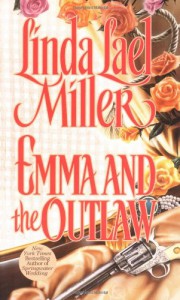

The cover attached to this review is for the original book, published in 1991. I read the 2014 reprint.
Emma Chalmers is a seven year old girl who, along with her two sisters Caroline and Lucy, are sent on the orphan train by their biological mother at the request of the mother's newest lover. Caroline is adopted first, leaving Emma and Lucy to continue on the train west. Emma is adopted by a woman who is hoping to get a free domestic servant for her household and possible sexual servant for her husband. Lucy continues on the train west. Emma is rescued at the train station by Chloe, a brother. and saloon owner who wanted a daughter and paid off the vile woman. Emma ends up in a nice home and has a good upbringing.
Chloe decides to open up a public lending library so Emma has a job after coming home from normal school (teachers' college). Even though Emma loves and defends Chloe, Emma also wants respectability. She feels her life is stained twice over with a biological mother who was weak for men and brandy and being the daughter of the local madam. Hence her courtship with Fulton Whitney, the banker; yet he leaves her cold. Emma hasn't given up on the dream of re-connecting with her sisters.
One day, a drunk decides to celebrate his birthday by bringing a stick of dynamite into another saloon and an explosion leaves many saloon patrons injured. One of those patrons is Steven Fairfax, a former Confederate soldier and an outlaw wanted in his home state of Louisiana. Chloe takes Steven into her home so that he can heal; Emma does nurse him back to health in between shifts at the library. There is a lot of lust from Steven's side already. A few days of nursing and they are having make out sessions. Steven decides to stay in Whitneyville and court Emma, Fulton be damned. Emma decides to play Steven against Fulton so she can be rid of both of them, but ends up falling for Steven.
Once the sex starts between Steven and Emma it doesn't stop. EVERY CHAPTER after Steven takes Emma's v-card in a field of daisies has at least one sex scene. Steven really likes Emma's breasts; so much nipple sucking and licking. Seriously after a while, the sex scenes were just repetitive nonsense.
Macon, Steven's half-brother and technically the real villain (although Fulton gives that role a real shot), is searching for Steven so he can bring Steven back to New Orleans to stand trial for the murder of Dirk (Macon's bastard son) and Mary McCall (Dirk's lover who wanted Steven....it's complicated). Macon uses Emma to get to Steven; they travel back to New Orleans, more family secrets are discovered, Macon repeatedly promises that he will rape Emma over and over again after Steven is hanged for his crimes, Macon actually attempts to rape Emma while the rest of the family is at Steven's trial, Lucy (Macon's wife) mental illness....Old skool romance crazy sauce is HIGH in this book. Being a romance, the true killer is found, Steven is cleared of all charges, Emma has a baby, finds one of her sisters, and Macon takes off for Europe.
Daisy, the African-American cook and house cleaner that works in Chloe's household is the only POC character that is treated with respect. The Fairfax plantation owners treat it's household help as if blacks were still slaves. Emma is the only one to show any respect for the workers. A few black characters are physically described by their hair and size/whiteness of their teeth. The black servants of other households in New Orleans were also given a crappy hand; the one black servant to the McCall family goes home to her husband who is the epitome of black angry man and abuser. And then there is this gem, courtesy of Lucy Fairfax:
"Please tell Miss McCall that Mrs. Macon Fairfax and Mrs. Steven Fairfax have come to pay a visit," Lucy said in a business-like tone that belied her odd ways. "And kindly don't leave us standing out here in the midday sun while you dillydally."
The woman hurried away, and Lucy turned to Emma and confided "You must be firm with people of color. After being told what to do for so long, they can't always be trusted to reason for themselves." (pg. 305)
It was at that moment that the book became intimately acquainted with the wall opposite my reading chair. Reminder: this book was published in 1991.....not 1891. Memo to publishers/authors: before reprinting old romances, revise/update/edit the fuck out some shit that you got away with earlier, for modern readers are going to red flag that shit. Between the racism and the constant verbal rape threats/real sexual assaults by Macon and Fulton on Emma, I started to become sick and couldn't wait for the book to end (I was curious about the killer's identity).
Maybe it's just bad timing reading this book after the IRL events of the last couple of weeks, but the bitterness held by the Southern characters over the Civil War was the last thing that I needed. Not a book I can recommend.

